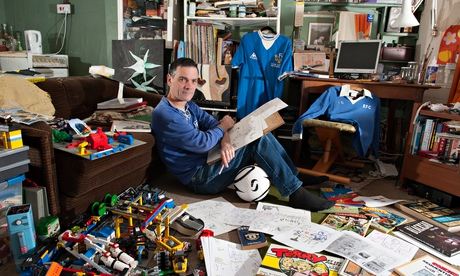
It’s 1892, and at Anfield a football team is rudely interrupted shortly before kick-off by the arrival of a spacecraft full of aliens keen to launch their planet’s bid to host the World Cup. For a while, confusion reigns. The aliens mistake the red-shirted Everton player Alex Latta (1867-1928) first for David Beckham and then for Zlatan Ibrahimovic. The humans have no idea what their little green visitors are on about when they ask if they’ve touched down at Wembley (the stadium didn’t open until 1923). But then things get even more complicated. Another alien craft appears, bearing a rival bid from a planet whose sulphurous atmosphere and searing heat brings to mind a certain World Cup-hosting Gulf state – and now things turn nasty. Boom! Suddenly, our mustachioed players have no choice but to scrub the fixture they were about to play. (Note for the slightly confused: in 1892 Everton’s ground was Anfield, now the home of Liverpool, and they played in a red strip that had a badge decorated, like the ones seen here, with the three lions.)
This is The Giants of Football by Richard Woods, the winner of the Observer/Jonathan Cape/Comica graphic short story prize 2015. In this, the eighth year of the prize, the standard was the highest it has ever been, and by some distance. The judges – our regular panel was joined this time by Sam Bain, the brilliant co-writer of Peep Show, a series whose title, in case you don’t know, is borrowed from Joe Matt’s comic of the same name, and Karrie Fransman, whose latest graphic novel is the excellent Death of the Artist – felt that half a dozen entries came close to winning. But in the end, it was Woods who triumphed, which must be quite pleasing for him, given that he has had a go every year since the competition began (“because a deadline is always a help”, as he puts it). We loved his story’s elegant lines, its surreal mood, its wit and, perhaps above all, its topicality. Several entries this year had subjects that spoke to the news, among them the housing crisis and the huge numbers of refugees on the move in Europe. But this was the only one that came with jokes about Sepp Blatter.
It was the suspended Fifa boss who was Woods’s first inspiration. “Blatter said something about football being so popular, it would one day be played on another planet,” he says. “That got me thinking. I had the story jotted down a while before the arrests were made [14 defendants were charged with racketeering in the US in May] and for a moment, I thought, oh, bollocks. But then I realised it didn’t really matter. Nothing much was going to change, not in the short term. So I kept at it.”
Woods, you will not be surprised to learn, is an Everton fan. He’s also our oldest winner (he was born in 1959). An after-school play worker who lives in Crosby, Merseyside, he did a foundation course at Southport College in the 70s but never took a degree, and afterwards did a variety of jobs, among them a 10-year stint teaching comics at Liverpool Community College. Thanks to this, he did not struggle with the limitations of our competition (each story must be only four pages long): “I used to ask my students to make their comics that length.” His influences include Hergé and Moebius.
What does winning mean to him? “I hope it might be a bit of a foot in the door,” he says. “I’ve got some 40- to 60-page projects I wouldn’t mind showing to someone. But we’ll see. The great thing is that there has never been a commercial imperative behind my comics. I’ve always had a day job.”
What does he plan to do with his prize money? (He takes home a cheque for £1,000.)
“I’ve got a lad of nine. This might mean he gets a bit more Lego for Christmas.”
Our runner-up this year is 29-year-old Seokhan Jung for his elegiac memoir Back Soon, which begins with the funeral of its narrator’s grandfather in Korea, on a day so snowy the mourners must tie straw ropes around their shoes if they are to clamber to the mountain grave. Jung, whose story of exile and loss – it is inspired by real events – will appeal to fans of Fumio Obata and Marjane Satrapi, makes fine use not only of Korea’s tragic 20th-century history, but also of its culture and language (Back Soon, for instance, owes its title to the fact that in Korean “going back” is a euphemism for death).
Jung is from South Korea, but has been living in the UK since 2009: “The trigger was Dave McKean [the British illustrator and comics artist]. I was into his graphic novels, and I wanted to see what he saw. So I just bought a plane ticket. After that, I finished my BA in illustration at the London College of Printing.”
For him, being runner-up changes everything. “I can trust myself more now,” he says. “It feels like a sign that I can really start.” He hopes to publish his first full-length graphic novel soon.
An exhibition of the stories shortlisted for this year’s competition (and some past winners) can be seen at Orbital Comics, 8 Great Newport Street, London WC2 until Sunday as part of the Comica festival; comicafestival.com. The Bristol festival of ideas will host a Jonathan Cape graphic novel evening including Posy Simmonds, Kate Beaton, Evie Wyld and Joe Sumner on Monday 23 November, 6.30pm; ideasfestival.co.uk

